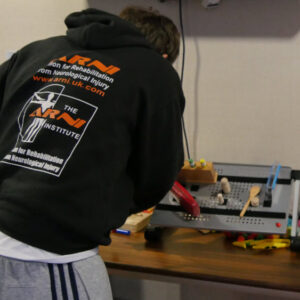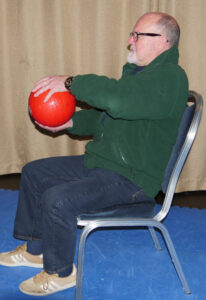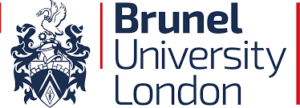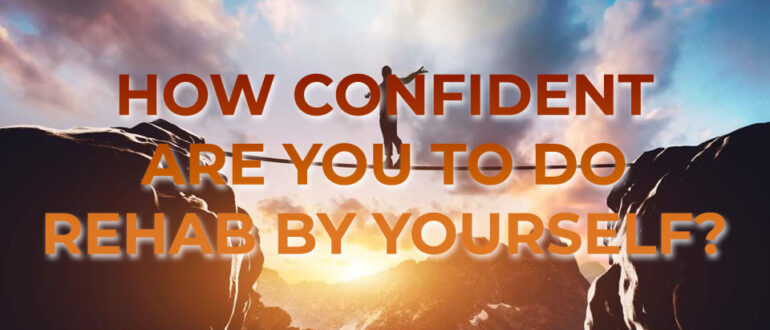How confident are you in doing your home exercises provided by your therapist or ARNI instructor?
 Rehabilitation after stroke is a partnership between you and your ARNI instructor or therapist. You’ll know that regular practice of techniques and exercises is necessary to optimise progress after stroke, but during the times that your Instructor isn’t present, these may or may not be difficult to perform.
Rehabilitation after stroke is a partnership between you and your ARNI instructor or therapist. You’ll know that regular practice of techniques and exercises is necessary to optimise progress after stroke, but during the times that your Instructor isn’t present, these may or may not be difficult to perform.
So, have you ever been given exercises to do at home after your stroke? How confident did you feel to do those exercises without guidance? Or how confident would you feel doing them?
It’s well known that confidence is something many people may struggle with when exercising, especially when starting a new exercise programme. For instance, you may worry that you are doing the exercises incorrectly, or find it hard to make yourself practice as often as you know you should. Researchers use the term self-efficacy to describe how confident we feel to successfully carry out a particular action; in this case retraining home by ourselves.
Research has found that people with a high level of self efficacy are more likely to regularly practice their home exercises, especially without motivation or supervision from others. Research also shows that many stroke survivors find it difficult to access home retraining, for many reasons.
Theoretically therefore, it may be possible, by attaching measures to a number of stroke survivors’ levels of self efficacy (for carrying out home retraining independently), it may be possible to identify those survivors who are not so confident… and therefore highlight the requirement for additional help (and in what ways) for these people.
 Currently there is no stroke specific measurement tool available to do this. This study aims to address this gap in stroke rehabilitation.
Currently there is no stroke specific measurement tool available to do this. This study aims to address this gap in stroke rehabilitation.
Can you help the researchers by giving approximately 30 minutes of your time and completing an online questionnaire?
Working under the supervision of Dr Cherry Kilbride and Dr Elmar Kal and with ethical approval from Brunel University London, Dylan Kerr and Kevin Murray are carrying out research to help develop a stroke-specific self efficacy measure for doing home exercises.
CALLING ALL STROKE SURVIVORS – PLEASE HELP BY GETTING INVOLVED IN THIS STUDY IF IT IS APPROPRIATE TO YOUR SITUATION!
What will I need to do if I would like to help, and take part in the study?
- Click here to access the study
- Read the Participation Information Sheet for more information and give your consent
- Complete the background questionnaire (questions about living with stroke, mentally and physically) followed by 2 quick self-efficacy scales
- One week later, we will send you a short version of the questionnaire (10 minutes) to complete. This is to see if anything has changed in your self-efficacy scores
A tip: For the best display of the questionnaire graphics, use a laptop/desktop computer or tablet.
Thank you!
Your responses will be anonymised prior to the analysis. The results of the study will be reported in the form of a written MSc dissertation, and may be published in international scientific journals. Please note that your information will kept confidential at all times, and no identifying information will be reported.
 If you have any questions, please contact Dylan Kerr (2028493@brunel.ac.uk) or Kevin Murray (1908047@brunel.ac.uk), or call our designated research phone (07342 793564). Additionally, you can contact project supervisors Dr. Elmar Kal (Elmar.Kal@brunel.ac.uk) or Dr. Cherry Kilbride (Cherry.Kilbride@brunel.ac.uk) for any inquiries if you wish.
If you have any questions, please contact Dylan Kerr (2028493@brunel.ac.uk) or Kevin Murray (1908047@brunel.ac.uk), or call our designated research phone (07342 793564). Additionally, you can contact project supervisors Dr. Elmar Kal (Elmar.Kal@brunel.ac.uk) or Dr. Cherry Kilbride (Cherry.Kilbride@brunel.ac.uk) for any inquiries if you wish.



